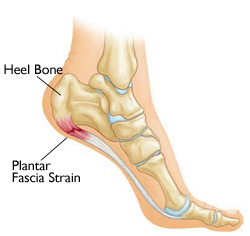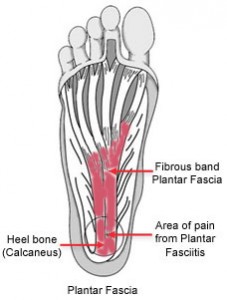In our latest blog, we hope to provide an understanding of a common complaint which we see regularly in clinic at Coastal Physiotherapy – Plantar Fasciitis
Plantar fasciitis is the most common cause of pain on the bottom of the heel.

Plantar fasciitis occurs when the strong band of tissue that supports the arch of your foot becomes irritated and inflamed.
Anatomy
The plantar fascia is a structure that runs from the front of the heel bone (calcaneus) to the ball of the foot. This dense strip of tissue helps support the arch of the foot by acting something like the string on an archer’s bow.
As you can imagine, when the foot is on the ground a tremendous amount of force (the full weight of the body) is concentrated on the plantar fascia. This force stretches the plantar fascia as the arch of the foot tries to flatten from the weight of your body. This leads to stress on the plantar fascia where it attaches to the heel bone. Small tears of the fascia can result. The body normally repairs these tears, but, sometimes, too much pressure damages or tears the tissues. The body’s natural response to injury is inflammation, which results in the heel pain and stiffness of plantar fasciitis.
Risk Factors
In most cases, plantar fasciitis develops without a specific, identifiable reason. There are, however, many factors that can make you more prone to the condition:
- Tighter calf muscles that make it difficult to flex your foot and bring your toes up toward your shin
- Obesity
- Very high arch
- Repetitive impact activity (running/sports)
- New or increased activity
Treatment
There are several treatment options available for plantar fasciitis. In order to provide the correct treatment approach and achieve fast and lasting relief from the pain it is important that the physiotherapist performs a thorough assessment of the injury and determines all potential causes for the onset of the problem.
At Coastal Physiotherapy, treatment may comprise of:
- Soft Tissue Release of the plantar fascia, calf muscles and other tightness in the lower back or leg which may be contributing
- Exercises to improve flexibility and strengthen weak areas
- Taping to provide support to the foot and plantar fascia and unload the inflamed tissue
- Ultrasound therapy to reduce inflammation in the plantar fascia
- Stretches specific to the plantar fascia
- Assessment of walking and running biomechanics to address underlying issues which may be increasing stress on the foot and ankle
- Advice on self-management strategies such as ice, Epsom salt foot soaks, activity modification to reduce irritation and maximise healing response
If you are suffering from Plantar Fasciitis or any other joint or muscle pain then the team at Coastal Physiotherapy are able to help relieve the pain quickly through specialised techniques such as Soft Tissue Release and also address and treat the cause of pain to ensure your relief is long-lasting. Phone us today to book your appointment on (07) 5443 6634. We look forward to “Getting You Better Faster”


